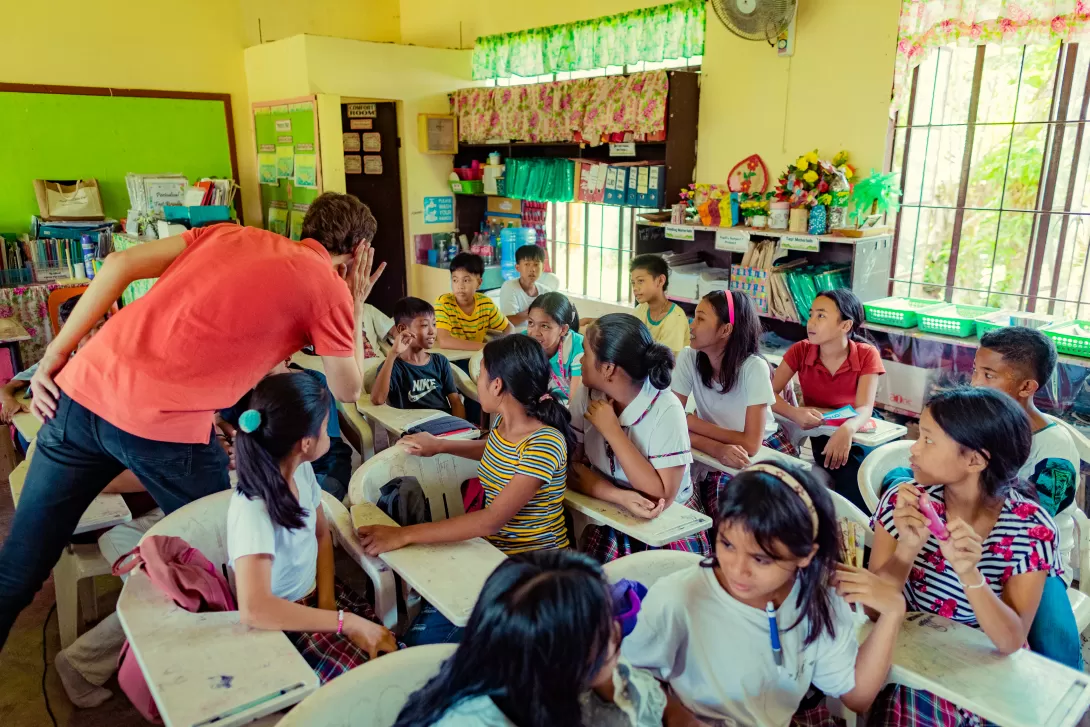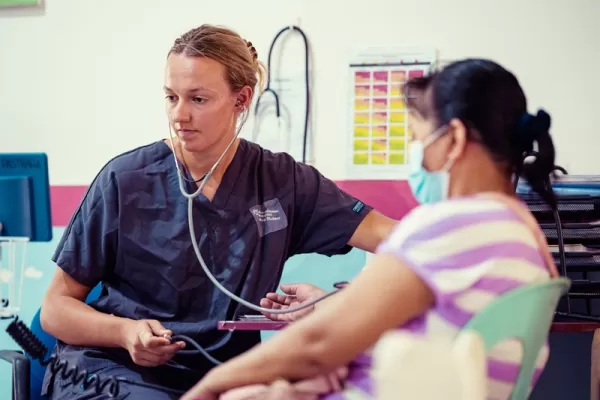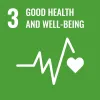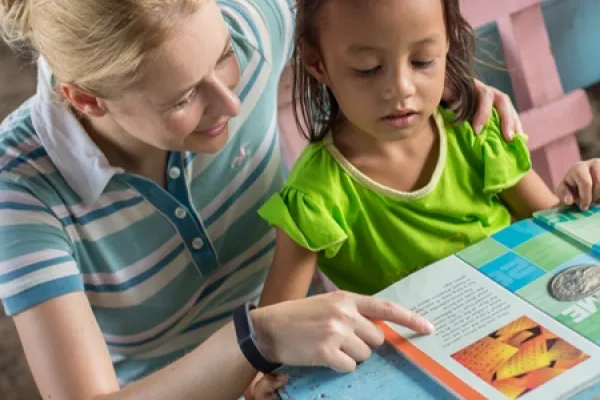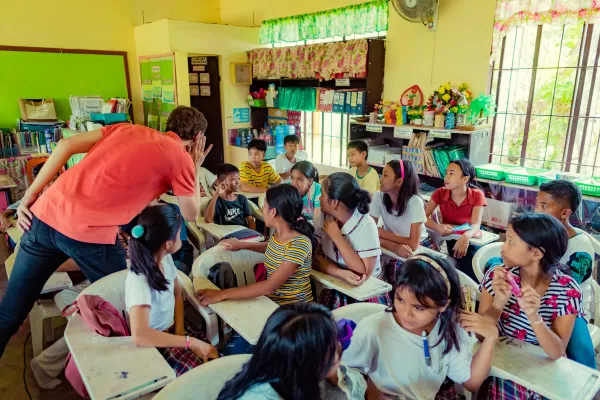Overview
A educação é uma das maneiras mais eficazes de dar suporte às comunidades carentes das Filipinas, que são atingidas pela pobreza. Como voluntário no Programa de Ensino nas Filipinas, os voluntários ajudarão os professores locais a desenvolver as habilidades de leitura, escrita e fala dos alunos em inglês. Aulas adicionais também são facilitadas para Matemática e Ciências. Também são oferecidas colocações em escolas de Educação Especial (SPED) para ajudar os professores a orientar alunos com desafios físicos e mentais. Escolas especiais que treinam e orientam crianças surdas, mudas e autistas também precisam de voluntários entusiasmados. Uma maneira gratificante e impactante de ajudar as comunidades rurais, o voluntariado para os filipinos certamente será uma experiência de aprendizado para todos.
O Teaching Project foi iniciado em resposta ao chamado de escolas públicas por voluntários estrangeiros que podem prestar serviço. As escolas acreditam que os voluntários estrangeiros têm um impacto positivo nos alunos, servindo como modelos e inspiração. Eles também ajudam as crianças a melhorar suas habilidades no idioma inglês. O projeto pode tirar você da sua zona de conforto, pois exigirá que você dê aulas ativamente todos os dias na frente de muitas crianças. A primeira semana é importante. Ela permitirá que você conheça seus alunos e veja como pode atender melhor às suas necessidades. Nós o encorajamos a tomar a iniciativa e ser proativo, dessa forma a escola saberá que você está pronto para assumir tarefas que você é capaz de executar. Você observará como as coisas são feitas e poderá fazer perguntas sobre coisas que você não entende completamente. O professor da sala de aula está prontamente disponível para apoiá-lo durante todo o seu programa.
Perfil de colocação de amostra: Escola primária Tugop
A Tugop Elementary School está localizada na vila rural de Barangay Tugop, no município de Tanauan, Leyte. A escola pode ser acessada por jipe e motocicleta. O tempo de viagem é entre 45-60 minutos, dependendo do ritmo dos veículos. Esta é uma escola pública sob a supervisão do Departamento de Educação. Ela está em vigor para servir a comunidade de Tugop.
A equipe da escola é composta pelo diretor e professores do ensino fundamental, incluindo o professor do jardim de infância, com um total de 207 alunos. Para preocupações durante o projeto, é recomendado que o voluntário fale com qualquer um dos professores, em particular o professor da sala de aula da classe que ele/ela está lidando.
Os coordenadores do programa local abriram o projeto de ensino para dar suporte à escola. Há apenas um professor por classe, lidando com várias disciplinas em um dia. A população da classe varia, mas geralmente entre 25-35 em áreas rurais. As disciplinas que o professor lida incluem matemática, ciências, inglês, educação física, história, música. A aula fica aberta de segunda a sexta, exceto durante feriados e atividades escolares. A aula começa por volta das 8h, faz uma pausa para um intervalo ao meio-dia e recomeça às 13h para fechar às 16h.
Como colocação, a escola se beneficia de ter um professor extra que pode ajudar a ensinar inglês, matemática, ciências ou música, dependendo da preferência do voluntário. Ter um voluntário estrangeiro que fale inglês é útil, pois dá às crianças a chance de aprender e praticar o idioma. Nas Filipinas, um bom domínio da língua inglesa é uma vantagem no emprego. Ao mesmo tempo, o voluntário serve como um modelo e inspira essas crianças a estudar para um futuro melhor.
Cronograma de trabalho voluntário
Cronograma de trabalho voluntário
Um cronograma típico de voluntariado neste programa é o seguinte;
Sábado/Domingo - Chegada e traslado para acomodação da família anfitriã
Segunda-feira - Orientação. Uma sessão de orientação será conduzida pelo coordenador local, cobrindo áreas temáticas; como segurança, cultura, idioma, lugares para visitar, comportamento, comida e outras sugestões sobre coisas para fazer nas Filipinas
Segunda a Sexta - Trabalho Voluntário
Café da manhã - 6:00 da manhã
Trabalho voluntário - 08:00 às 12:00 e 13:30 às 16:00
Almoço - 12:00 às 13:00 (os voluntários precisam providenciar o almoço por conta própria. Os participantes geralmente escolhem comer em um restaurante ou levar comida embalada.
Jantar - A partir das 18:00 horas
Fins de semana - Livre para explorar a cidade
O mesmo cronograma de trabalho voluntário continua a partir da segunda semana.
Observação: observe que o cronograma pode variar dependendo do projeto específico do qual o voluntário está participando.
Funções e responsabilidades dos voluntários
Funções e responsabilidades dos voluntários
Dadas as más condições das escolas primárias rurais, os voluntários fornecerão suporte valioso e importante aos professores. Os deveres dos voluntários no programa dependem da experiência e do nível de habilidade dos participantes. Algumas das principais funções e responsabilidades dos voluntários no programa de Ensino incluem:
Ensine qualquer uma das seguintes disciplinas preferidas: Inglês, Matemática, Ciências, Geografia, Artes, Informática
Alfabetização, Música, Dança, Programação, Carpintaria, Esportes etc.
Ministre aulas por conta própria ou ajude os professores
Ensinando classes de educação especial
Tornar as sessões entre professores e alunos mais interativas, envolventes e desafiadoras
Pode conduzir tutoriais após as aulas
Project Requirement
Project Requirement
Os voluntários devem ter 17 anos ou mais no momento da adesão ao projeto. Você precisa ter uma mente aberta e uma atitude flexível para trabalhar em um ambiente novo e diferente. O voluntário deve trazer energia e entusiasmo para fazer a diferença e ter paixão por trabalhar com crianças. Os participantes devem estar em forma e saudáveis no momento da adesão ao programa. Os participantes não devem ter condenações criminais e devem fornecer um relatório de verificação de antecedentes criminais limpo. Um formulário de consentimento dos pais será necessário para participantes menores de 18 anos que se juntem ao programa. Qualquer aluno ou profissional com paixão por ensinar mentes jovens, que ame trabalhar com crianças e adolescentes, incluindo crianças com necessidades especiais, é elegível para participar do projeto.
Schedule a Google Meet with a Program Advisor
Interested in our programs? We're here to provide expert guidance
- Get Detailed Info
- 20 min One -on-One meeting
- Get expert advise
- Application Guidance
Photo Gallery
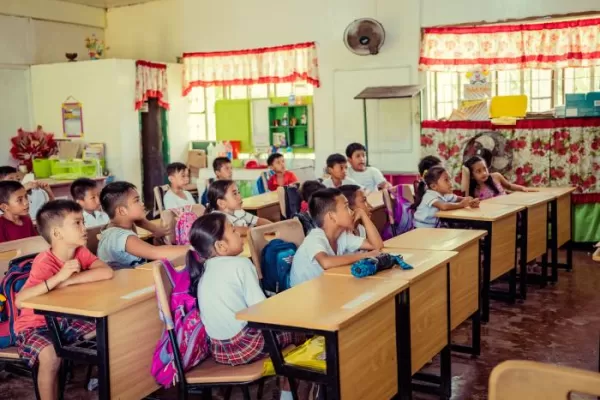
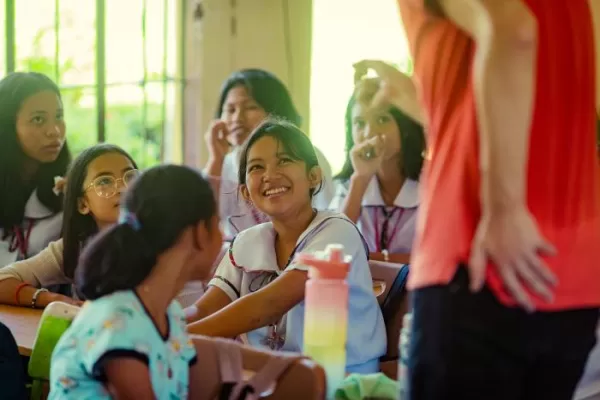
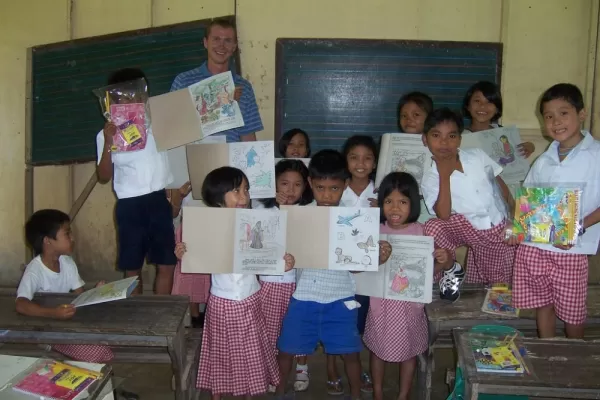
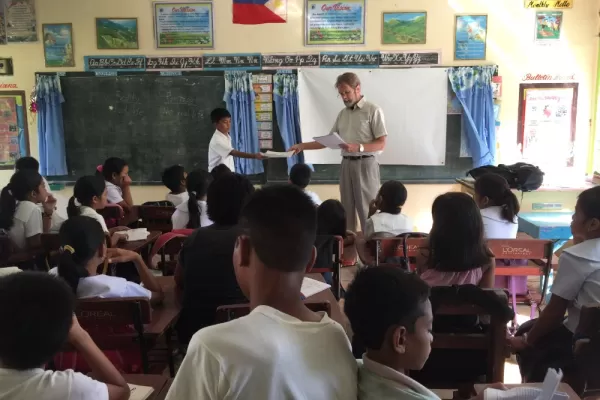
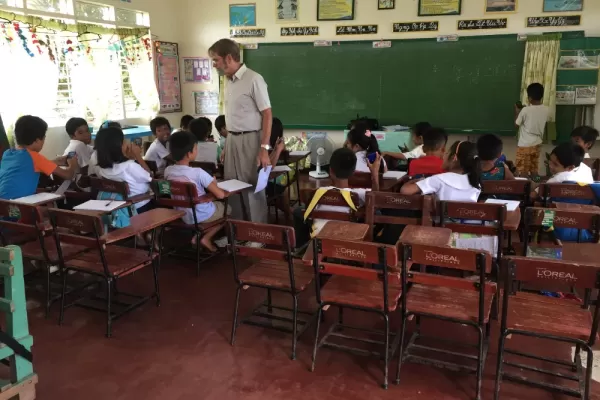
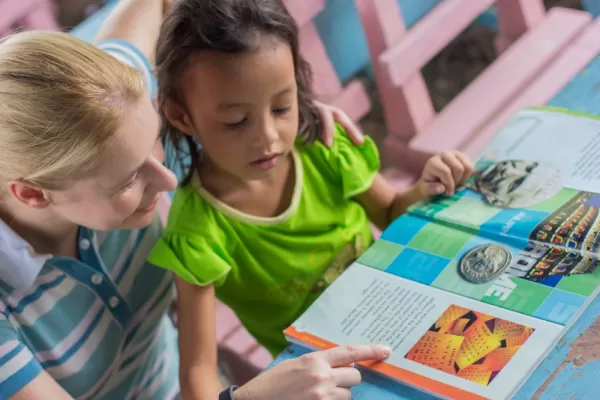
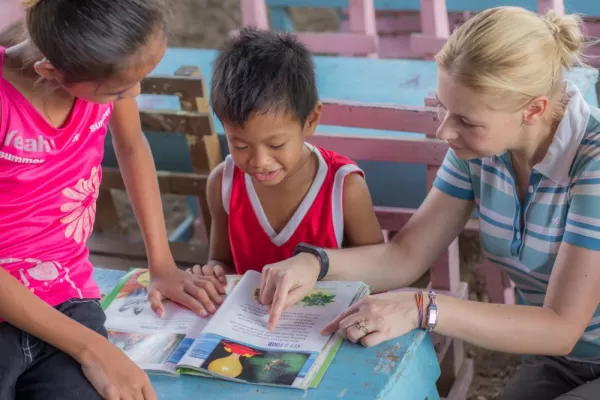
Living
Living
Transfer do aeroporto
Os voluntários são buscados e deixados no Aeroporto de Tacloban por um representante local. Os voluntários podem chegar no sábado ou domingo antes de iniciar a orientação na segunda-feira.
Orientação
A orientação acontece às segundas-feiras e inclui uma cobertura abrangente de diversos tópicos relevantes. É ministrada por um membro qualificado da equipe local. A orientação inclui as seguintes atividades:
Introdução ao programa, sua história, estrutura e organização
Introdução às Filipinas e à cultura filipina
O que esperar do Programa de Voluntariado
Briefing de Saúde e Segurança
Briefing de Política de Comportamento
Introdução à colocação real, com atenção especial ao transporte
Introdução à equipe de colocação e voluntários
Alojamento
Os voluntários viverão com famílias anfitriãs residentes na região de Tacloban. As famílias anfitriãs foram cuidadosamente avaliadas antes de serem aceitas em nosso programa de hospedagem. Temos experiência em acomodar voluntários internacionais. Antes da sua chegada, você receberá um perfil descrevendo as características da sua família anfitriã.
Sua família anfitriã o receberá em sua casa e o tratará como um membro da família. Ao morar com eles, você poderá vivenciar a cultura filipina e participar de suas atividades diárias. Você comerá a mesma comida que eles, embora sua família anfitriã saiba o que os estrangeiros gostam de comer. Se você tiver necessidades alimentares especiais, é melhor nos informar com antecedência para que possamos atendê-lo. Você receberá apenas duas refeições por dia: café da manhã e jantar. Sua família anfitriã também fornecerá água potável filtrada, pois é melhor não beber água da torneira. Todas as famílias anfitriãs têm eletricidade e água encanada. Você terá um quarto privativo, sozinho ou compartilhado com um colega voluntário. Você também receberá mosquiteiro e ventilador elétrico. O banheiro ou lavabo, comumente chamado de "quarto de conforto ou CR", será compartilhado com todos os membros da família.
As acomodações com banheiro são básicas e o voluntário tomará banhos frios de balde, pois chuveiros quentes são incomuns nas casas filipinas – não se preocupe muito com isso, pois banhos frios de balde costumam ser revigorantes depois de passar o dia todo no calor tropical. Por fim, os voluntários também terão que se acostumar ao som dos galos cantando antes mesmo do amanhecer.
Refeições
Durante o seu período como voluntário, você receberá duas refeições diárias (café da manhã e jantar) da sua casa de família. Além disso, a casa de família também fornecerá acesso a água potável. Todas as refeições serão servidas com arroz e geralmente incluem peixe, frango ou carne de porco. As casas de família podem atender a restrições alimentares especiais, no entanto, solicitamos que você inclua isso no formulário de inscrição.
Durante seu tempo livre
A equipe de coordenação local nas Filipinas organiza duas excursões para os voluntários. Em uma delas, os voluntários visitam pontos turísticos locais, como a Ponte San Juanico, o Santuário de Santo Niño e o Parque Memorial MacArthur Landing. Os voluntários terão a oportunidade de vivenciar a beleza natural da ilha tropical de Leyte.

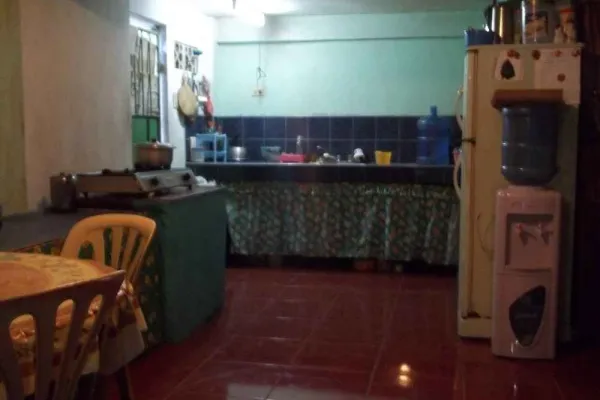
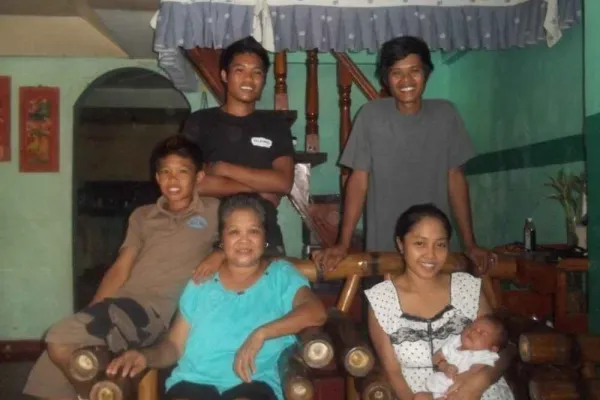
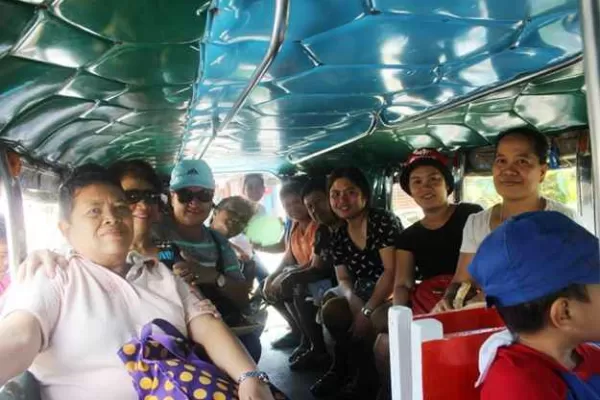
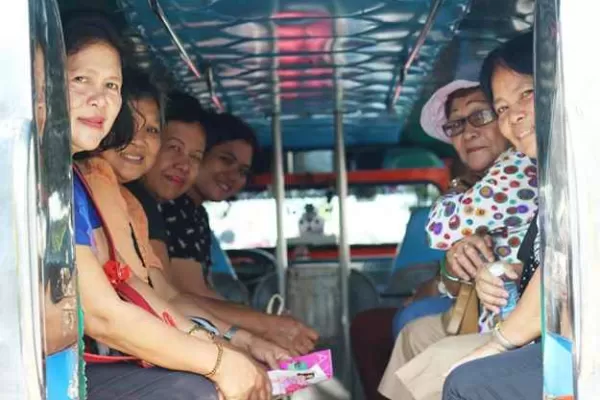
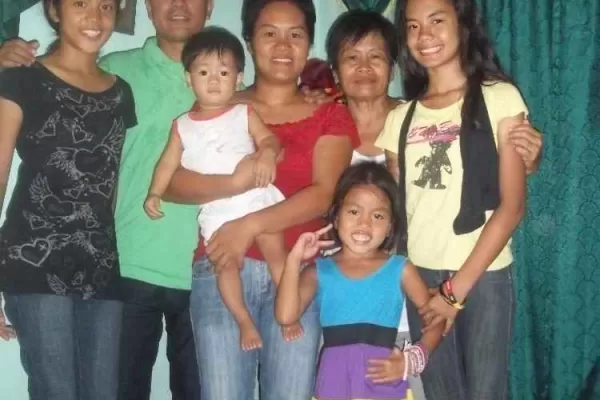
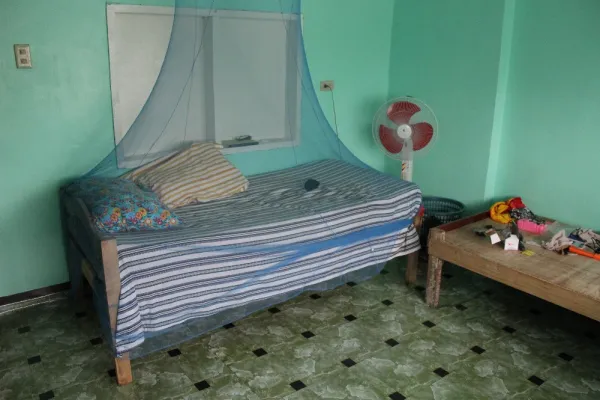
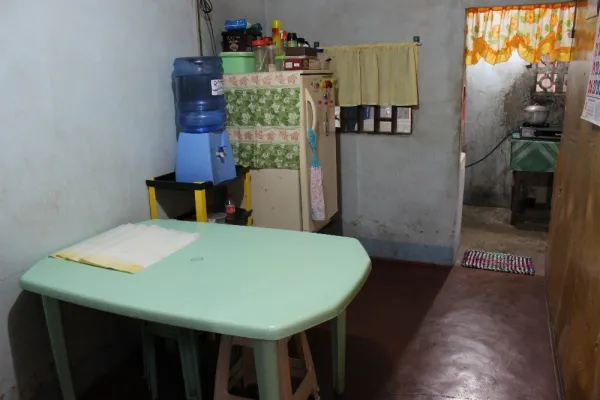
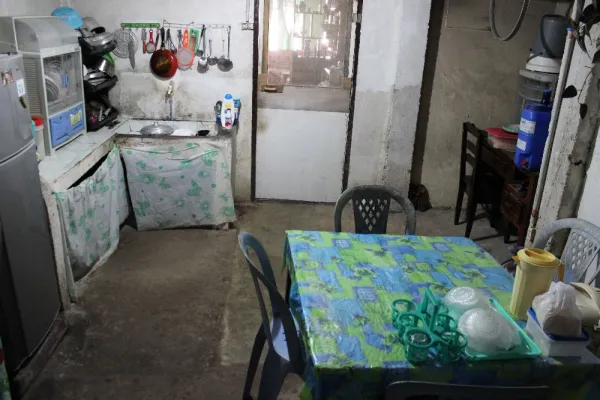
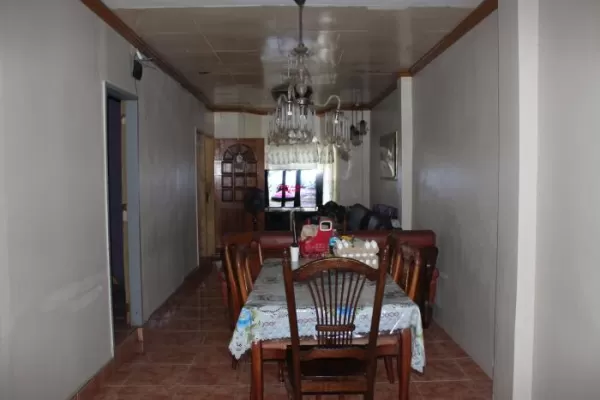
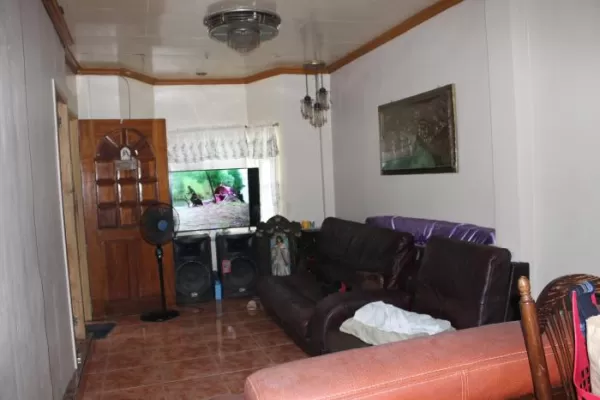
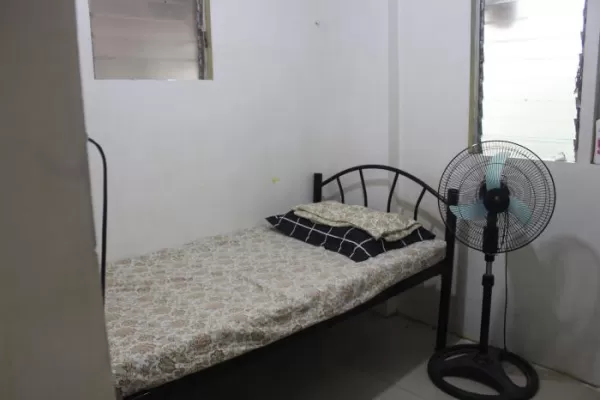
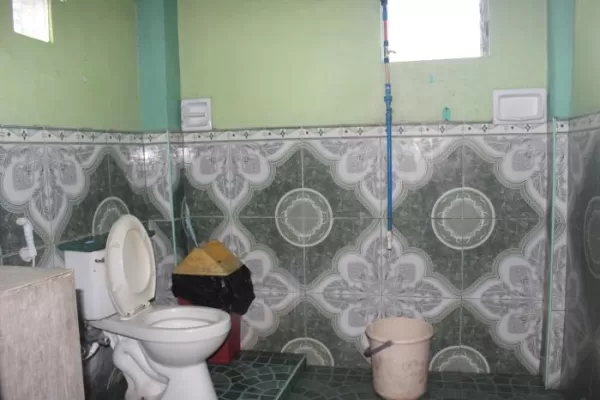
Dates
Dates
January
04
11
18
25
February
01
08
15
22
March
01
08
15
22
29
April
05
12
19
26
August
30
September
06
13
20
27
October
04
11
18
25
November
01
08
15
22
29
January
03
10
17
24
February
07
14
21
28
March
07
14
21
28
April
04
11
18
25
May
02
August
29
September
05
12
19
26
October
03
10
17
24
31
November
07
14
21
28
Costs
| Duration |
Program Fee
|
Choose your currency
|
|---|---|---|
| 2 Weeks | $890 | |
| 3 Weeks | $1040 | |
| 4 Weeks | $1190 | |
| 5 Weeks | $1340 | |
| 6 Weeks | $1490 | |
| 7 Weeks | $1640 | |
| 8 Weeks | $1790 | |
| Extra Week | $200 |
Please Note: A registration fee of is charged in addition to the program fee. This fee is valid for one year, during which participants may enroll in multiple programs. A 5% international banking fee applies to credit card payments of program fee made in USD or AUD.
O que você está pagando?
- Recolha e entrega no aeroporto
- Orientação de Boas-vindas – Orientação do Programa
City Tour e Orientação de Colocação - Acomodação em uma família anfitriã filipina
- 2 refeições por dia
- Pacote de informações detalhadas antes da partida
- Colocação de Projeto
- Assistência e suporte 24 horas por dia de funcionários locais
- Seguro de viagem e médico (disponível por um custo extra)
- Certificado de Participação (mediante solicitação)
O que NÃO está incluído?
- Visa
- Vacinações
- Voos
- Transporte local
- Despesas pessoais
FAQ's
Alojamento, refeições e vida diária
-
Como faço para chegar ao local do programa?
-
Seu coordenador de projeto o levará ao local de trabalho e o apresentará a todos após uma breve orientação sobre o programa, a cidade, a cultura etc. Antes de iniciar o projeto, você receberá uma orientação completa, que incluirá instruções sobre como chegar e voltar do local, como ir e voltar do centro da cidade (localização de caixas eletrônicos, restaurantes, lojas de souvenirs e casas de câmbio), além de uma breve introdução à cultura e etiqueta filipinas.
O 'Jeepney', um ônibus colorido feito a partir de antigos veículos militares americanos, é o meio de transporte mais comum nas Filipinas e é utilizado para viagens de curta a média distância. Este é o meio de transporte mais comum entre os voluntários em Tacloban.
Para viagens mais longas, existem ônibus convencionais, enquanto motocicletas, triciclos e táxis particulares, chamados de "Spider Cabs", também podem ser usados para viagens de média distância. Se você pretende apenas percorrer a rua de baixo, pode optar por um triciclo motorizado, uma bicicleta adaptada com um carrinho lateral acoplado.
-
Poderia me dar mais informações sobre acomodação e alimentação?
-
A Volunteering Solutions organiza acomodações para voluntários com famílias filipinas locais na comunidade. Hospedar-se com uma família local é uma experiência enriquecedora e parte da imersão cultural, permitindo conhecer seu modo de vida, costumes e tradições. As famílias anfitriãs são membros respeitados da comunidade local, selecionados criteriosamente e com vasta experiência em receber voluntários. Você terá um quarto individual ou compartilhado, com espaço seguro para guardar sua bagagem (traga seu próprio cadeado), repelente de mosquitos e ventilador. Água potável também estará disponível. Pedimos aos voluntários que sejam conscientes em relação ao consumo de energia elétrica. Serão fornecidas duas refeições por dia (café da manhã e jantar), que podem variar, mas geralmente serão pratos tradicionais filipinos. Prepare-se para comer bastante arroz!
-
Terei tempo livre durante o meu programa? Posso fazer passeios turísticos durante o meu programa?
-
Os voluntários têm os fins de semana livres para passear e socializar com outros voluntários do programa. A cidade de Tacloban oferece opções para quase todos os tipos de viajantes, desde o Shopping Robinsons até belas praias ensolaradas nos arredores da cidade. O que você fará durante seu tempo livre é totalmente por sua conta, mas nossa equipe pode ajudá-lo(a) a planejar sua viagem. Os voluntários também podem relaxar nos diversos resorts de praia, principalmente no Tadjaw Beach Resort, perto do município de Tolosa. Para aqueles que buscam oportunidades mais interessantes em outros lugares, é possível planejar uma viagem de fim de semana para Cebu, visitar as Colinas de Chocolate em Bohol ou as Cavernas de Sohoton em Samar.
-
Haverá mais despesas quando eu chegar em Tacloban?
-
A taxa de inscrição no programa não cobre suas despesas pessoais. Você precisará arcar com seus custos pessoais, como transporte local, telefone, internet, compras, passeios turísticos etc. No entanto, é recomendável levar entre US$ 50 e US$ 70 por semana para suas despesas pessoais básicas. Esse valor pode variar e você precisará de uma quantia maior caso faça viagens de fim de semana para fora da cidade.
-
Terei acesso à internet?
-
O escritório parceiro local atualmente possui acesso à internet e Wi-Fi, mas os voluntários devem ter cuidado com o uso da internet, já que os funcionários também compartilham a conexão para as operações gerais da empresa. Os voluntários também podem visitar algumas cafeterias no centro de Tacloban (nosso coordenador de voluntários mostrará como chegar ao centro durante o passeio pela cidade), que fica a 15-25 minutos de carro da sua hospedagem, que possuem Wi-Fi, bem como pequenos cibercafés onde é possível pagar por hora para usar o computador/internet.
-
Terei acesso a água potável limpa?
-
Todas as famílias anfitriãs fornecerão água potável limpa para seus voluntários. Água mineral também está amplamente disponível em pequenas lojas por toda a vizinhança, bem como em supermercados maiores. Ao pedir água em restaurantes, é sempre importante perguntar se a água é mineral e se o gelo é feito com água da torneira.
Entre em contato com ex-voluntários
-
Como posso entrar em contato com ex-participantes do programa Volunteering Solutions, bem como com outros ex-voluntários e voluntários atuais?
-
Incentivamos os voluntários a entrarem em contato com ex-participantes do programa Volunteering Solutions, bem como com outros participantes que estejam se juntando aos nossos projetos. Recomendamos que você participe da página ou do grupo do Volunteering Solutions no Facebook para se comunicar com outros participantes.
Para ler entrevistas com ex-participantes, visite a seção "Conheça um Voluntário" em nosso site. -
Você pode me colocar em contato com outros voluntários que já participaram deste programa?
-
Só podemos fornecer os dados de contato de ex-voluntários que consentiram em compartilhar suas informações. No entanto, existe um grupo no Facebook para ex-voluntários e voluntários atuais, ao qual você pode se juntar. Há também centenas de avaliações online de nossos ex-voluntários, além de publicações em nossas redes sociais, como Instagram , TikTok e nosso canal no YouTube .
Informações sobre voos, chegada e vistos
-
Preciso de visto para viajar para as Filipinas?
-
Cidadãos da maioria dos países podem entrar nas Filipinas e obter um visto na chegada ao aeroporto, com validade de 30 dias. Seu passaporte deve ter validade mínima de 6 meses a partir da data de entrada nas Filipinas. O visto também pode ser prorrogado durante sua estadia no país. Voluntários que participam de programas de longa duração podem solicitar o visto antecipadamente na embaixada das Filipinas mais próxima.
-
Quais são as companhias aéreas recomendadas para voar para Tacloban, Filipinas?
-
Você precisará chegar em Manila e de lá pegar um voo de conexão para Tacloban. Manila possui ótimas conexões aéreas, com voos diretos partindo de importantes destinos internacionais. O Aeroporto Internacional Daniel Z. Romualdez (código do aeroporto: TAC) em Tacloban é a principal porta de entrada de Manila e Cebu para a região de Visayas. As companhias aéreas AirAsia Zest, Pal Express, Philippine Airlines e Cebu Airlines oferecem voos de Manila para Tacloban.
Saúde, Segurança e Suporte
-
Preciso comprar um plano de saúde?
-
Sim, é obrigatório que todos os participantes tenham um seguro de viagem com cobertura médica. Os voluntários têm a opção de adquirir um seguro de viagem com cobertura médica por um valor adicional simbólico através da Volunteering Solutions. Para oferecer a melhor opção aos nossos participantes, disponibilizamos uma cobertura de seguro abrangente em parceria com uma seguradora líder de mercado. Para consultar os detalhes da cobertura do seguro, clique aqui.
-
Quão seguras são as Filipinas e a cidade de Tacloban em geral?
-
A cidade de Tacloban é acolhedora para turistas e as Filipinas são, em geral, um país seguro. No entanto, recomenda-se que os voluntários viajem em grupo, não se aventurem sozinhos à noite e tomem as precauções básicas de segurança. Todos os voluntários devem consultar os coordenadores antes de planejar uma saída noturna e seguir as dicas de segurança necessárias. A Ilha de Leyte é geralmente segura para viajantes. Como em qualquer outro país, turistas e visitantes devem sempre tomar precauções ao viajar para o exterior.
-
Quais imunizações/vacinas eu precisarei tomar?
-
Recomendamos que consulte seu médico ou um médico especializado em medicina de viagens antes de viajar para as Filipinas. No entanto, recomendamos que tome vacinas gerais como:
- Hepatite A e B
- Tifóide
- Comprimidos para malária
A vacinação contra a febre amarela é obrigatória para viajantes que chegam de países com risco de transmissão da febre amarela ou que transitaram por esses países.
Visão geral do programa e processo de inscrição
-
Quando devo me candidatar aos programas de voluntariado nas Filipinas?
-
Para os programas nas Filipinas, recomenda-se a inscrição o mais breve possível após a escolha do programa e das datas desejadas. Cada programa tem um número limitado de vagas, por isso, solicitamos que os voluntários reservem sua vaga assim que as datas forem definidas. Seguimos a política de "primeiro a chegar, primeiro a ser servido".
-
Quais são os locais do programa nas Filipinas?
-
Os projetos estão localizados na cidade de Tacloban, na ilha de Leyte, na região de Visayas Oriental. Tacloban fica a aproximadamente 580 quilômetros a sudoeste de Manila e é conhecida por ter sido o local do desembarque do general americano Douglas MacArthur no Golfo de Leyte, que marcou o início de uma intensa campanha para retomar as Filipinas do Japão durante a Segunda Guerra Mundial.
-
Poderia me dar mais informações sobre Tacloban?
-
Tacloban também abriga a prestigiosa Ponte San Juanico, a mais longa das Filipinas. Essa ponte conecta as ilhas de Leyte e Samar e é um elo fundamental na Rodovia Pan-Filipina, que liga as ilhas filipinas de Luzon, Samar, Leyte e Mindanao por meio de uma rede de estradas, pontes e balsas.
Tacloban é a capital da província de Leyte e tem uma população de cerca de 240.000 habitantes. Não é um destino turístico popular e não atrai muitos visitantes estrangeiros. Por esse motivo, Tacloban oferece aos nossos voluntários internacionais a oportunidade de mergulhar em uma cultura asiática singular. -
Quanto tempo levará para processar minha inscrição? Minha inscrição será aceita?
-
Normalmente, o processamento da candidatura e a confirmação da vaga levam de 10 a 12 dias úteis. Após a aprovação da candidatura, o documento de colocação será atualizado na sua conta online, onde poderá consultar as informações. A aprovação da candidatura depende da disponibilidade de vagas no projeto e dos critérios de elegibilidade do programa (idade, competências, experiência, etc.).
-
Há algum requisito necessário para participar dos programas de voluntariado em Tacloban, Filipinas?
-
Abaixo estão os requisitos necessários para participar dos projetos de voluntariado nas Filipinas:
- Os voluntários devem ter 18 anos ou mais no momento de ingressar no projeto.
- Os voluntários precisam ter a mente aberta e uma atitude flexível para trabalhar em um ambiente novo e diferente. Devem trazer energia e entusiasmo para fazer a diferença.
- Os participantes devem estar em boas condições de saúde.
- Os participantes devem fornecer uma cópia de seu currículo, bem como um relatório de verificação de antecedentes criminais para aqueles que trabalham em projetos com crianças.
-
Posso fazer trabalho voluntário em grupo?
-
Para voluntários individuais:
Você chegará na mesma data de início que outros voluntários que se juntarem ao mesmo período e fará parte de um grupo para o seu programa. Isso significa que vocês compartilharão o mesmo dia de orientação, acomodação e experiência geral; uma ótima maneira de conhecer novas pessoas e fazer amigos do mundo todo. A melhor época para participar, se você quiser conhecer muitos outros voluntários, é julho e agosto, pois esses são os meses mais populares.
Para grupos:
Se você já tem um grupo, também aceitamos inscrições de grupos universitários e de faculdades, grupos de escolas de ensino médio, equipes corporativas, famílias e grupos de amigos. Seu grupo pode preencher nosso Formulário de Inscrição para Grupos, fornecendo detalhes como o número de participantes, a duração desejada, o orçamento e o destino. Nos dedicamos a encontrar a opção ideal para o seu grupo, e podemos personalizar o roteiro para garantir que você tenha exatamente a experiência que procura. Para grupos de cinco ou mais pessoas, podemos até mesmo criar programas especiais que combinam trabalho voluntário significativo com imersão cultural e oportunidades de viagem. Todos os nossos programas, sejam individuais ou em grupo, são projetados para serem seguros, acessíveis e gratificantes, oferecendo a cada voluntário uma experiência memorável e impactante. -
Quando preciso chegar em Tacloban para o meu programa? O que acontecerá quando eu chegar na cidade?
-
Todos os voluntários devem chegar a Tacloban na data de início do programa. Os voluntários serão buscados no aeroporto de Tacloban pelo coordenador ou representante local e levados até a acomodação da família anfitriã. Após o traslado, serão levados até a comunidade, onde se encontram a maioria das casas de família e o escritório principal. O trajeto dura cerca de 10 a 15 minutos.
-
Por quantas horas irei trabalhar como voluntário todos os dias?
-
Os voluntários geralmente trabalham de 5 a 6 horas por dia, dependendo do programa. Você terá o fim de semana livre para viajar. No entanto, os voluntários precisam ser flexíveis, ter a mente aberta e entender que as exigências do trabalho também podem mudar em determinadas ocasiões.
-
Como faço para me inscrever em um programa e quando preciso efetuar o pagamento?
-
Você pode reservar sua vaga preenchendo o formulário de inscrição online e pagando a taxa de inscrição. O pagamento da taxa do programa pode ser feito posteriormente ou em parcelas, porém, o pagamento integral deve ser efetuado 45 dias antes do início do programa. Se você for se voluntariar em grupo, também poderá preencher um formulário de inscrição para grupos. A taxa de inscrição inicial será reembolsada caso não seja possível oferecer uma vaga no programa, e você terá a flexibilidade de solicitar uma alteração da data de início até o prazo de 45 dias para o pagamento (sujeito à disponibilidade de outras datas).
-
O que acontece se o programa não estiver disponível?
-
Reembolsaremos a taxa de inscrição caso o programa não esteja disponível após a sua inscrição.
-
Posso me inscrever junto com um amigo?
-
Sim! Em nosso formulário de inscrição, você pode informar o nome do(s) amigo(s) ou parceiro(s) com quem está se inscrevendo. Vocês serão alocados no mesmo projeto e acomodação.

























